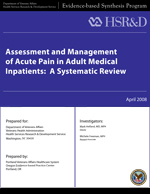
|
Investigators: Mark Helfand, MD, MPH and Michele Freeman, MPH. Portland VA Healthcare System, Oregon Evidence-based Center Washington (DC): Department of Veterans Affairs; April 2008. |
Download PDF: Complete Report, Executive Summary, Report, Appendices
The prevalence of pain on the inpatient medical ward is lower than that of a surgical service, but is still substantial. A systematic review was conducted, including an integration of the existing literature on the delivery of effective pain care in the acute care setting, to inform the VA's National Pain Management Strategy and the VA's pain research agenda. The key questions addressed were:
Poor pain management in surgical settings is known to be associated with slower recovery, greater morbidity, longer lengths of stay, lower patient satisfaction, and higher costs of care, suggesting that optimal pain care in these settings is of utmost importance in promoting acute illness management, recovery, and adaptation. VA/DoD Clinical Practice Guidelines have been developed for the management of acute post-operative pain, although the basis for many of the recommendations was by expert consensus rather than empirical evidence.
The prevalence of pain on the inpatient medical ward is lower than that of a surgical service, but is still substantial. In one hospital survey, 43% of medical ward patients experienced pain, and 12% reported unbearable pain. There are currently no pain-relevant performance measures in place that can support efforts to enhance pain care in these settings, and research on pain management in nonsurgical, nonmalignant acute pain is sparse.
Helfand M, Freeman M. Assessment and management of acute pain in adult medical inpatients: a systematic review. Pain Medicine. 2009; 10(7):1183-99.